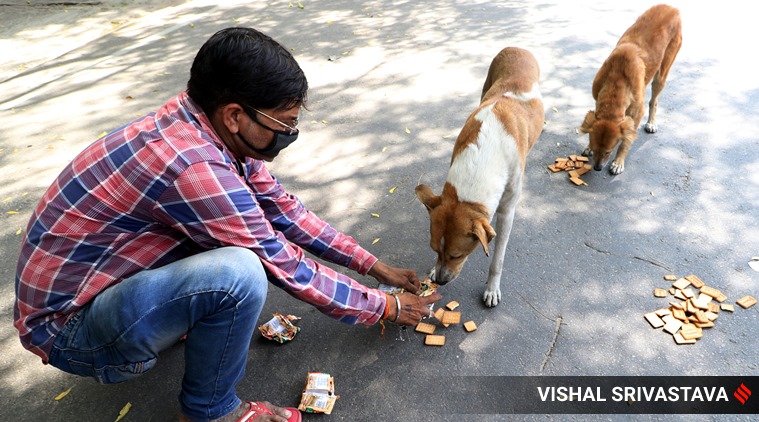 A man feeds stray dogs during lockdown
A man feeds stray dogs during lockdown
Meghna Uniyal
Having challenged the legality of the ABC rules passed under the direct aegis of Maneka Gandhi and becoming a party to the ongoing stray dog case in the Supreme Court, I have read with great interest the ongoing debate on India’s dog policy in The Indian Express.
While Coomi Kapoor raised important questions concerning public health and safety (‘Gone to the dogs’, IE, July 27), the responses, including that by Maneka Gandhi herself (‘For the love of dog’, IE, July 30) simply obfuscated key issues. The attempt is to wash away any accountability on the part of dog feeders by giving moral sermons on “compassion” and chide anyone objecting to nuisance created in public places, for wanting to “kill dogs.”
Despite being the key authority for implementing the Animal Birth Control (dog) rules, the Animal Welfare Board of India has avoided taking any responsibility for the rising number of dog bites, rabies deaths and unregulated dog feeding, by blaming the municipalities. It is pertinent to note that it is the statutory, civic duty of municipal corporations under the state municipal acts to keep the streets of straying animals, check the spread of diseases and prevent public nuisance. This is the very bedrock of local governance and cannot change. Absurdly, under the ABC rules, municipalities are instead being forced to leave unowned dogs outside people’s homes and on the streets — the exact opposite of the WHO guidelines for dog population management.
Concepts like animal welfare and compassion are subjective issues at best, but it needs to be clarified that there is neither a constitutional obligation nor any inalienable right to carry out self-styled “animal welfare” activities in public places, however altruistic they may appear. Remarkably, the term “street dogs” (supposedly “urban scavengers” that must necessarily live on the streets) is not found anywhere in the Constitution nor in the Prevention of Cruelty to Animals Act (1960). It was in fact coined under the ABC (Dog) rules 2001. Thanks to these rules, India has the dubious distinction of creating an entity called “street dogs”, that have to perforce spend their lives there.
Subsequent articles have side-stepped the issue of irregularities in the functioning of the AWBI and animal NGOs, as pointed out in internal reviews of the ABC programme, by claiming “confusion” over which ministry should deal with the issue of stray dogs and rabies. Inexplicably, the logical choice of the Ministry of Health never crossed the government’s mind. Instead, the ABC rules were framed under the Ministry of Culture, which Maneka Gandhi then headed.
One writer has put forward the extraordinary claim of a decrease in rabies deaths in India. One only has to glimpse unending queues outside government hospitals waiting for rabies shots to know the real situation. Incidentally, the WHO-sponsored study of rabies in the country states that the actual number of rabies fatalities in India is possibly “10 times more than reported” because rabies is still not a notifiable disease in the country.
It is interesting to note that while the AWBI has submitted to the Supreme Court that “The overall, ultimate answer to street dog population control is to control the availability of edible wastes”, we are being told at the same time that it is our moral obligation to in fact provide food for stray dogs as it is supposedly the panacea to all related problems. Conservation scientist, Abi T Vanak of ATREE Bangalore, who has studied the impact of free-roaming dogs and related issues of rabies, stray dog feeding, wildlife and public health in the country, notes: “There is a severe science deficiency in understanding the problem of rabies and of controlling the dog population in India. From an ecological point of view, the more resources in the environment, the higher the population that will be supported. Therefore, for pro-feeding’ groups to contend that feeding dogs helps in reducing population size is an oxymoron. Feeding animals also tends to concentrate them in certain areas. Most people who feed dogs only notice the friendly behaviour of dogs, but those very same dogs can become very aggressive to a passer-by. Children are particularly vulnerable. Further, if the core issues of responsible dog ownership and reducing access to resources are not fixed, then ABC will have to be continued in perpetuity.”
While on the issue of animals and compassion, it is pertinent now more than ever, to revisit the teachings of Mahatma Gandhi on animal welfare and dogs, articulated in his paper Young India. Gandhiji described feeding stray dogs as “a false sense of compassion.’’ He wrote: “Even those who feed stray dogs consented to pay a penalty for their misdirected compassion, we should be free from the curse of stray dogs… We offend against dogs as a class by suffering them to stray and live on crumbs or leavings from our plates that we throw at them and we injure our neighbours also by doing so.”
Almost 100 years later, his beliefs are more relevant than ever before.
The writer is Director & Co-founder, Humane Foundation for People and Animals